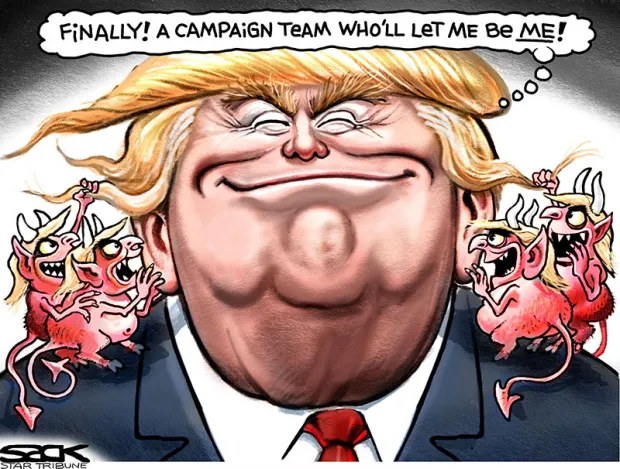Let’s get something straight right out of the gate: Donald J. Trump is not a monster. That would imply a level of mythic menace he frankly hasn’t earned. No, Trump is a man—a man who, like a slightly overgrown theater kid who never got the lead role, craves attention, validation, and applause more than your average Golden Retriever on Red Bull. He’s a bit narcissistic (okay, more than a bit), a tad detached from reality (we’re being kind here), but fundamentally? He just wants to be loved. Or at least obeyed. Or maybe just retweeted.
Yes, he’s got the subtlety of a wrecking ball and the self-awareness of a houseplant, but his thirst for approval is almost… endearing, in a tragic sort of way. If he weren’t playing dress-up with nuclear codes and democratic norms, he might’ve made a solid game show host. Oh, wait.
Trump’s Imaginary Friends: “John Barron” Will See You Now
Before he was the self-declared “stable genius” in the White House, Donald Trump was already proving his talents as a one-man PR department—literally. Back in the 1980s and 90s, Trump would call up reporters pretending to be someone else entirely—most famously under the pseudonyms John Barron and John Miller—to gush about how fabulous Donald Trump was. Because when the media isn’t fawning over you enough, why not do it yourself in a fake voice?
In one now-infamous 1991 recording obtained by The Washington Post, “John Miller” just happens to sound exactly like Trump. And wouldn’t you know it—this totally-not-Donald-Trump guy was calling up reporters to spill inside dirt on Trump’s love life, his wealth, and how basically every woman in Manhattan wanted to date him. How convenient.
When pressed on it years later, Trump denied it was him. But, oops—he had already admitted under oath in a 1990 court case that he had used the name “John Barron” before. It’s a little hard to keep your lies straight when your alter ego is on the legal record.
Journalist David Cay Johnston, in his book The Making of Donald Trump, covers this bizarre chapter in detail. He describes how Trump routinely manufactured media attention, inflating his net worth, popularity, and desirability with the help of his trusty imaginary friends. It was like playing make-believe, but with real estate and national news coverage.
It’s almost cute—like a child putting on a puppet show to get attention. Except the child is a grown man who somehow ended up controlling America’s nuclear codes.
But here’s the thing: the real danger isn’t the man waving his arms on stage shouting about crowd size and toilet flushes. It’s the people behind the curtain—the ones whispering into his ear, stroking his ego, telling him he’s not just right but chosen. These are not needy showmen or reality TV relics. These are people who know exactly what they’re doing. And that? That’s where things get dark.
Take Stephen Miller, for instance. If Voldemort and a DMV line had a baby, it might resemble the dead-eyed architect of the family separation policy. He didn’t just implement cruelty—he delighted in it. The suffering of children at the border wasn’t a bug of the system. It was the feature. Miller doesn’t see crying toddlers as human beings. He sees them as threats to a mythical “Western civilization” he apparently learned about from a very racist storybook.
Then there’s Russ Vought, the quiet little ideologue behind Project 2025, the charming little manifesto aimed at replacing constitutional democracy with a theocratic autocracy. It’s a plan to gut the federal government and replace it with purity tests—religious, ideological, and let’s be honest, probably racial too. You know, just good ol’ American values, if America was founded by the Handmaid’s Tale writers.
And of course, Steve Bannon, the man who looks like he crawled out of a haunted whiskey barrel. Bannon doesn’t hide his goals. He brags about them. He wants a permanent Trump presidency—two terms, three, five, however many it takes to finish the “deconstruction of the administrative state,” which is fancy talk for demolishing every institution that stops men like him from turning the country into a white-nationalist fever dream. The Constitution? Cute. The 22nd Amendment? Optional, apparently.
Now, normally, you’d have safeguards. The FBI, for instance, does background checks to ensure key officials aren’t compromised by foreign powers or personal vulnerabilities. Little things like massive debt, blackmail potential, ties to foreign adversaries. You know—minor stuff. But under Trump, those background checks… Gone. Instead, we got Kash Patel—a man with as much experience in federal law enforcement as your neighbor’s dog—and a penchant for conspiracy theories and enemies lists that make Alien Lizard People look like peer-reviewed science.
Here’s the uncomfortable truth: a man as emotionally stunted, praise-hungry, and validation-dependent as Trump doesn’t need to be a genius or a plotter. He just needs to be in the room. The dangerous ones are those who know how to manipulate someone like him—who feed his fantasy, his delusions, his endless need to feel powerful, adored or feared.
Trump may not be a monster, but he is the perfect vessel for them. A man hollowed out by decades of insecurity, obsessed with his image, desperate to prove himself to a world he thinks laughed at him—and easily swayed by flattery, fear, or force. And with long-standing ties to people like Vladimir Putin, dating back to at least 1987, it’s not hard to see why many believe he’s been compromised. That’s not a conspiracy. That’s just reading the room.
So no, Trump is not a monster. But maybe that’s not the cause of relief it might seem.
A monster you can fight. A man doesn’t have to be evil to be manipulated by monsters.
That’s where the real horror begins.
